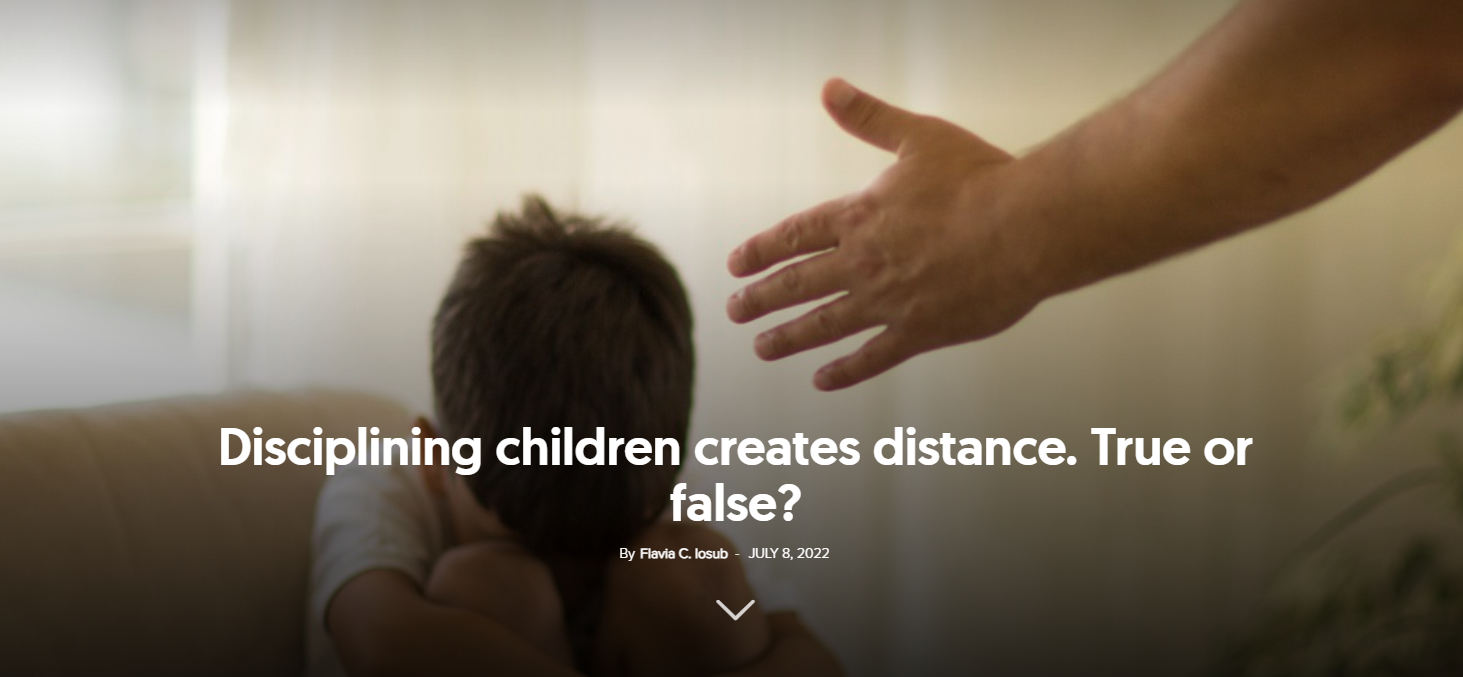To err is human. “The only sure way to avoid making mistakes is to have no ideas,” Albert Einstein said.
One can often encounter lapses that betray the inherent character of everyday-life mistakes in what we do or say. “Only those who do not work do not make mistakes” goes another popular saying, which shows that errors are closely related to action, to the very dynamics of life.
Mistakes—or, better said, deviations—from the established rules often also define the young and curious who, in their drive to discover everything that surrounds them, to defy limits and recommendations, can experience failures, make surprising decisions, or mistakes.
The way adults react to these mistakes significantly affects children, specifically their ability to manage failures in the short, medium, and long term. When the adults in question are the reference figures in the personal universe of the little ones (parents, grandparents, older brothers or sisters), then the impact is all the stronger. In this case, the reactions either support or, on the contrary, compromise the self-confidence of the little ones, shaping their resilience.
Personal failure and intelligence
Parents deal with children’s mistakes in distinct, even opposite, ways. Responses vary from understanding, gentleness, or empathy to harshness or severe criticism, and have the power to shape children’s perception of their own intelligence. Researchers from Stanford University (California) have validated the hypothesis that a “positive” or “negative” label placed by parents on children’s failures causes children to consider themselves more or less smart, influencing their entire future.
The study led by Dr. Kyla Haimovitz from the Department of Psychology analysed the responses of 73 parent-child pairs, to whom questionnaires related to the meaning of personal failure and intelligence were applied. While the feedback of the participants did not establish a relevant connection between what parents and children believed, at a declarative level, about intelligence, their answers denoted similarities regarding the attitude towards the subject.
It was thus observed that adults who were disappointed and anxious about the poor results of primary or secondary school pupils instilled in them the belief that they cannot improve their academic performance, because intelligence is a fixed attribute. On the other hand, parents focusing on what the children could learn following the unfavourable evaluations instilled in the latter the possibility of change, of progress from “modest” to “better” and from “good” to “excellent”. They conveyed the message that once trained, intelligence can be strengthened the same way a muscle is.
Encouraging efforts
Constantly exposed to criticism, and not to encouragement, the little ones end up limiting themselves. Reproaches such as “You’re so lazy!” or statements like “I don’t know what to do with you, you let me down!” corrupt their sensitive minds, which are prone to deeply internalise the sentences of adults who suggest to them that they are inferior and incapable of change. Children thus miss one of the most important life lessons, namely: mistakes can be transformed into precious learning opportunities.
In order to avoid the materialisation of this scenario, parents should instead refer to the child’s actions, not to their way of being. A child interprets the statement “You behaved badly” differently than “You are bad”. Pertinently drawing one’s attention to a temporary behaviour confirms the idea that there are better alternatives, while the second option conveys the message that the problem, being intrinsic, has no great chance of being solved.
If adults emphasise the good things and leave what children do badly in the background, positive changes occur much faster. Acknowledging and encouraging children’s efforts, whether manifested at the level of intention, attempt, or achievement, motivates them to subsequently reproduce the desired behaviour. Recent studies demonstrate that encouragement, used as a reaction to children’s efforts to do good things, leads to the achievement of good academic performances.
The art of problem solving
Beyond reinforcing positive behaviours, how should parents react when children make mistakes?
An experiment carried out on a group of preschoolers indicates that it is not criticism, blaming, or shaming that helps to correct them when they make mistakes, but the science of teaching them the art of problem solving. Starting from the question: “Can you find a better option?” the experiment aimed to observe what happens when preschoolers are invited to look for solutions.
The children involved in the project were challenged to imagine that they had to build a house out of Lego pieces for their teacher, but they forgot to add an important element: windows. Afterwards, the participants are divided into four groups and faced with four distinct endings.
Those in the first group were told that the teacher made a disapproving remark about the lack of windows, exclaiming: “I’m disappointed in you!” (criticism of the person).
Those in the second group were told that the teacher said: “That’s not how a house is made” (criticism of the outcome). Those in group number three were told that the teacher noticed the error and urged the children to find a new way to accomplish the mission (criticism of the process). Children in the control group were only told that there were windows in the house, with no additional comments.
The answers obtained by the interviewers during the questionnaires showed that the group exposed to personal criticism was affected to a greater extent by the educator’s approach. Her vehement attitude paralysed the preschoolers’ desire to return to the project, to make the necessary improvements. At the opposite pole, the children in the second group and (especially) those in group three expressed optimism in relation to their ability to build a better house, showing openness in this regard.
Although the situation gets more complicated in the case of behavioural problems with deeper roots, we could say that the principles remain the same regardless of the context, and the chances of making progress in the right direction increase for children who feel understood, accepted, and encouraged on their way to change.
The freedom to make mistakes
Some adults start from the premise that the little one is the parent’s mirror and rush to correct the slips. As Katherine Reynolds Lewis, author of The Good News About Bad Behavior, argues, this belief is quite widespread and generates a parenting culture based on fear.
In an attempt to keep their image intact in front of the world, parents tend to minimise the child’s feelings in the process of moulding him or her, to blame them for failures, or to confuse what they do with what they are, forgetting that mistakes can also be constructive.
Children deprived of the opportunity to learn from their own mistakes become adults who are so frightened by personal failures that they refuse to take calculated risks or enjoy new experiences in their emotional, social, or professional life because of their low self-esteem and the lack of skills necessary for problem-solving.
Unlike them, children who are allowed the freedom to make mistakes and extract practical lessons from the failures they experience, are also given the chance to become more confident in their ability to overcome obstacles, more emotionally skillful, and more socially adapted.
A different system
In order to achieve this performance, it is necessary for parents to show empathy to their children, to provide a concrete example of responsible behaviour, but also permanent support. Studies carried out about 10 years ago conclude that positive parenting techniques (based on understanding and encouragement) are more effective than harsh disciplinary practices (based on blame and coercion), the rule being applied both in the family context and in the classroom.
In one of the studies, teachers trained to replace punitive disciplinary measures with a different system, focused on solving problems (treating the cause, not just the effects), helped reduce the dropout rate among secondary school pupils by 50%.
At home, such a system can be used if parents:
- Reassure children that they do not expect perfection from them;
- Give them unconditional love, despite their errors of judgement or behavioural problems;
- Do not try to correct their mistakes, but collaborate with their children to find solutions together;
- Give examples of their own mistakes, followed by the presentation of the consequences and the lessons learned;
- Encourage children to take responsibility for their own actions, without blaming others for personal failures;
- Avoid always bringing up certain mistakes from the past;
- Appreciate children’s willingness to admit their mistakes;
- Appreciate children’s effort and courage to face the “falls”;
- Teach children how to apologise when they wrong someone;
- Help children see the good side of something done wrong.
Trial and error
Over time, the school system has not promoted learning by trial and error. Nor have parents given up on traditional models of education. However, part of the scientific community warns about the limits of standardised pedagogical methods, incompatible with creativity and innovation, campaigning for the introduction of atypical educational formulas which place pupils in the position of making mistakes and, implicitly, of identifying and implementing viable solutions.
How does learning from mistakes differ from classical learning based on avoiding mistakes? First, learning from mistakes increases motivation to respond to challenges and fuels effort to achieve desired results, two essential elements in the self-realisation equation. In a parental context, the system requires careful supervision by adults, which allows them to step in, when necessary, to help children progress despite the errors already committed but also potential errors that may arise.
An experiment conducted by psychologist Carol Dweck from Stanford University shows that such support provided by parents is more effective than that delivered on the basis of arguments such as: “You can do X because you are a smart child (and therefore immune to mistakes)”.
As part of the research, children from the 5th grade were invited to solve a difficult test, specially designed for 8th grade students. While performing the tasks, some participants were praised for their intelligence, others for their visible effort to pass the “exam”. Pupils valued for their effort tried their best to complete the exercises, even if they also committed glaring errors. Pupils complimented for cleverness became discouraged under the pressure of expectations projected on them, considering their mistakes as obvious signs of failure. Differences also appeared in the results, in favour of those appreciated for their effort.
To convey to children that failure is not an indicator of lack of intelligence and, implicitly, that showing intelligence does not guarantee the total absence of failures in life, it is recommended that parents:
- Notice their children’s reaction to failure and channel their feelings towards the desire to better themselves with the next opportunity;
- Focus on the future, transforming the present experience into a learning tool for similar situations;
- Observe and objectively interpret their own reactions: Are they useful for the little one? Do they express understanding, warmth, a desire to help or, on the contrary, discourage the child?;
- Teach children to value the experience rather than the result, emphasising the positive aspects (and how the less good things can be improved);
- Do not express pity towards children—excessive attempts to console them can convey the message that they are not capable of accepting failure or overcoming it;
- Put failure/setback into perspective: the unsatisfactory result does not define the child (all human beings face such situations);
- Get involved in an activity preferred by the little ones, to help them feel better in their own skin and gain a new perspective on things, by disconnecting from unpleasant events;
- Do not force the correction of mistakes, nor take responsibility for the children’s mistakes;
- Instil in them security and acceptance.
“Knowledge rests not upon truth alone, but upon error also,” Swiss psychologist C.G. Jung said. When turned into a good teacher and strongly anchored in reality, mistakes can teach us—regardless of age—precious lessons, from which real bits of wisdom, innovation, and courage can be born.
Genia Ruscu has a master’s degree in social work counselling.




















